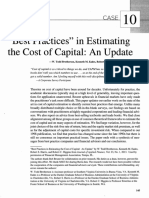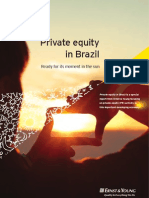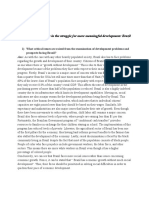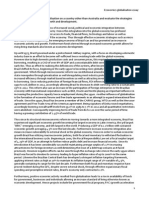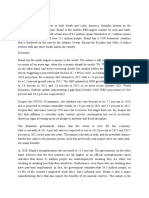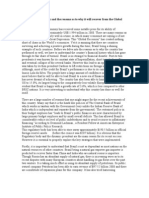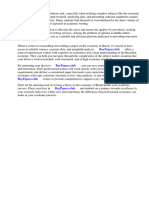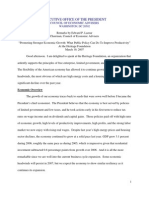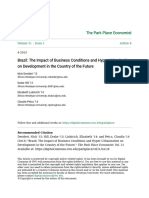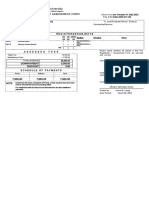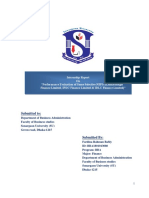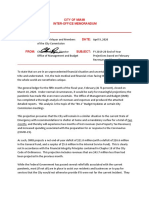Economic Situation in Brazil
Economic Situation in Brazil
Uploaded by
Anıl AlbayrakCopyright:
Available Formats
Economic Situation in Brazil
Economic Situation in Brazil
Uploaded by
Anıl AlbayrakOriginal Description:
Original Title
Copyright
Available Formats
Share this document
Did you find this document useful?
Is this content inappropriate?
Copyright:
Available Formats
Economic Situation in Brazil
Economic Situation in Brazil
Uploaded by
Anıl AlbayrakCopyright:
Available Formats
ECONOMIC SITUATION IN BRAZIL - 2023
Brazil is the largest economy in Latin America and the ninth-largest economy in
the world, with a population of over 200 million people. Brazil has a mixed
economy that is based on agriculture, manufacturing, and services. However, the
country has faced significant economic challenges in recent years, including high
inflation rates, political instability, and a deep recession. In this essay, we will
examine the current economic situation in Brazil and the factors contributing to its
challenges.
One of the key factors contributing to Brazil's economic challenges is its high
inflation rate. Inflation has been a persistent problem in Brazil for many years,
with rates reaching as high as 10% in some years. High inflation erodes the
purchasing power of the currency and can make it difficult for businesses to plan
for the future. It can also contribute to social unrest, as people struggle to make
ends meet.
Another factor contributing to Brazil's economic challenges is its history of
political instability. The country has experienced frequent changes in government
and political turmoil, which has contributed to economic uncertainty and
volatility. This has made it difficult for businesses to plan for the future and has
deterred foreign investment.
Brazil's economic challenges have been exacerbated by a deep recession that
began in 2014. The recession was caused by a combination of factors, including a
drop in commodity prices, political scandals, and high inflation. The recession
lasted for two years, with the economy shrinking by more than 7% during that
time.
The recession had a significant impact on Brazil's labor market, with
unemployment reaching record highs. The unemployment rate peaked at 13.7% in
2017, with more than 13 million people out of work. This has contributed to social
unrest and political instability, as people struggle to find work and make ends
meet.
In addition to the recession, Brazil has also faced significant fiscal challenges in
recent years. The government has been running large budget deficits, which have
contributed to the country's high levels of debt. The government has
implemented austerity measures in an attempt to reduce the deficit, but these
measures have been unpopular and have contributed to social unrest.
Brazil's economic challenges have also been exacerbated by a decline in
commodity prices. Brazil is a major exporter of commodities, including soybeans,
iron ore, and oil. The decline in commodity prices has reduced the country's
export revenue and contributed to its economic challenges.
Despite these challenges, there are some positive developments in Brazil's
economy. The country has a highly educated and skilled workforce, with a strong
emphasis on science and technology education. This has helped to foster a
growing tech industry in Brazil, with many startups emerging in recent years.
In addition, the country has significant potential for renewable energy
development. Brazil has abundant wind and solar resources, which could help to
reduce the country's reliance on fossil fuels and contribute to economic growth.
The government has also implemented policies aimed at promoting economic
growth, including tax incentives for businesses and investment in infrastructure.
The government has also implemented policies aimed at reducing inflation and
stabilizing the currency, although progress has been slow.
In conclusion, Brazil is facing significant economic challenges, including high
inflation rates, political instability, and a deep recession. These challenges have
contributed to economic uncertainty and volatility, making it difficult for
businesses to plan for the future. However, there are some positive developments
in the economy, including the growth of the tech industry and the potential for
renewable energy development. The government is working to address these
challenges through policy reforms, but progress has been slow.
You might also like
- Mortgage Payment Calculator Amortization ScheduleDocument2 pagesMortgage Payment Calculator Amortization ScheduleJane de Rama100% (1)
- Case Study AnalysisDocument12 pagesCase Study AnalysisVaibhavi Gandhi83% (6)
- Case 10 PDFDocument28 pagesCase 10 PDFDuren JayaNo ratings yet
- Economic Analysis of Brazil's GDPDocument3 pagesEconomic Analysis of Brazil's GDPmarcello.didonatoNo ratings yet
- The Pharmaceutical Industry in BrazilDocument16 pagesThe Pharmaceutical Industry in BrazilAlexandreNo ratings yet
- Brazil DocumentDocument9 pagesBrazil DocumentDhaliwal JassNo ratings yet
- Globalisation (Brazil) SpeechDocument2 pagesGlobalisation (Brazil) SpeechCarlin SloanNo ratings yet
- Growth Without Development (Brazil)Document3 pagesGrowth Without Development (Brazil)Danica Christele AlfaroNo ratings yet
- 5 World Economy Reading BrazilDocument4 pages5 World Economy Reading BrazilNeyl Joud BoujemaouiNo ratings yet
- CS1 - Brazil - G3Document7 pagesCS1 - Brazil - G3HANNA ROLISH DIGAMONNo ratings yet
- Case StudyDocument6 pagesCase StudyCheryl RamosNo ratings yet
- Petrobras Fallout Adds To Pressure On Rousseff: BrazilDocument4 pagesPetrobras Fallout Adds To Pressure On Rousseff: BrazilborjanavasNo ratings yet
- Brazil’s Economy Bounces Back to Pre-Pandemic Levels While Covid-19 Still Rages - WSJDocument7 pagesBrazil’s Economy Bounces Back to Pre-Pandemic Levels While Covid-19 Still Rages - WSJThadeuNo ratings yet
- Brazil BubbleDocument1 pageBrazil BubbleDanillo Gabriel NakanoNo ratings yet
- Pestle AnalysisDocument2 pagesPestle AnalysisLuis JoseNo ratings yet
- Why Invest in BrazilDocument5 pagesWhy Invest in BrazilRaju PatelNo ratings yet
- Country Review - Unemployment Rate MidtermsDocument9 pagesCountry Review - Unemployment Rate MidtermsPamela MahinayNo ratings yet
- EY Private Equity in BrazilDocument20 pagesEY Private Equity in Brazilvijay4victorNo ratings yet
- DE Case Study 1Document2 pagesDE Case Study 1Aalizae Anwar YazdaniNo ratings yet
- Monthly Spotlight BrazilDocument4 pagesMonthly Spotlight BrazilCharlesson1No ratings yet
- EconomyDocument6 pagesEconomyDrakeson LlaneraNo ratings yet
- Economic Progress and Human Advancement in The Philippine ContextDocument6 pagesEconomic Progress and Human Advancement in The Philippine Contextmayeee.eNo ratings yet
- Tough Encounter To BricsDocument5 pagesTough Encounter To BricsShiva Shankar PandianNo ratings yet
- Perfil Brazil (Ejemplo de Redacción) PDFDocument6 pagesPerfil Brazil (Ejemplo de Redacción) PDFNorbitGNo ratings yet
- UNLIKELY TO HIT TARGET HSBC Pegs Philippines' 2019 GDP at 6%Document5 pagesUNLIKELY TO HIT TARGET HSBC Pegs Philippines' 2019 GDP at 6%BLINK OT4No ratings yet
- The Brazilian Economy in Transition:: Macroeconomic Policy, Labor and InequalityDocument27 pagesThe Brazilian Economy in Transition:: Macroeconomic Policy, Labor and InequalityCenter for Economic and Policy ResearchNo ratings yet
- Administracion Financiera InternacionalDocument6 pagesAdministracion Financiera InternacionalSergio Vega MarínNo ratings yet
- Brazil - Case StudyDocument2 pagesBrazil - Case Studysimrangill32100% (1)
- Brazil - Case Study PDFDocument3 pagesBrazil - Case Study PDFThird MontefalcoNo ratings yet
- Eco DebateDocument3 pagesEco Debatejen71619No ratings yet
- Brazil PESTLEDocument6 pagesBrazil PESTLEyash sharmaNo ratings yet
- Brazil 1Document2 pagesBrazil 1emelia87No ratings yet
- Forward-Looking Macroeconomic Policies For Inclusive and Sustainable DevelopmentDocument4 pagesForward-Looking Macroeconomic Policies For Inclusive and Sustainable DevelopmentUNDP TürkiyeNo ratings yet
- Economics CIA1Document9 pagesEconomics CIA1kothari080903No ratings yet
- Research Paper On Brazil EconomyDocument5 pagesResearch Paper On Brazil Economygz8zw71w100% (1)
- Economic Growth of The PhilippinesDocument2 pagesEconomic Growth of The Philippinesmohannad amanollahNo ratings yet
- Executive Office of The President: Council of Economic AdvisersDocument14 pagesExecutive Office of The President: Council of Economic AdviserslosangelesNo ratings yet
- Brazil_ The Impact of Business Conditions and Hyper-UrbanizationDocument12 pagesBrazil_ The Impact of Business Conditions and Hyper-Urbanizationkhanhhuyen29114No ratings yet
- BrazilDocument4 pagesBrazilprashantNo ratings yet
- Ayesha Sohail-18681-Growth - Development-Assignment 1Document15 pagesAyesha Sohail-18681-Growth - Development-Assignment 1Ayesha SohailNo ratings yet
- Chile's Growth Opportunities and Challenges To Development: Rodrigo Vergara Governor Central Bank of Chile April 28, 2016Document8 pagesChile's Growth Opportunities and Challenges To Development: Rodrigo Vergara Governor Central Bank of Chile April 28, 2016harshnvicky123No ratings yet
- BrazilDocument2 pagesBrazilhana_kimi_91No ratings yet
- (01 - (08.13) - 19) Case Study Draft 01 (01-14-18)Document10 pages(01 - (08.13) - 19) Case Study Draft 01 (01-14-18)Vincent Luigil AlceraNo ratings yet
- InternationalDocument13 pagesInternationalmayuraprasadaberathnNo ratings yet
- Brazil-A Difficult Present, An Urgent Future-An Interview With Maria Da Conceição Tavares (A J by Ricardo Bueno) 1985Document8 pagesBrazil-A Difficult Present, An Urgent Future-An Interview With Maria Da Conceição Tavares (A J by Ricardo Bueno) 1985Pedro NunoNo ratings yet
- Investments ProjectDocument5 pagesInvestments ProjectMustafa SethiNo ratings yet
- Reflection On MacroeconomicsDocument4 pagesReflection On Macroeconomicsjoyce KimNo ratings yet
- Macroeconomic and Financial StabilityDocument6 pagesMacroeconomic and Financial StabilityKhalisah Kamar ShahNo ratings yet
- 2018 A Level GP EssayDocument3 pages2018 A Level GP EssayVasuda MukundanNo ratings yet
- NPC AddressDocument15 pagesNPC AddressPolitical AlertNo ratings yet
- Performance TaskDocument19 pagesPerformance TaskNadine Ailet CornelNo ratings yet
- Argumentative Essay (Current Development Status of PH)Document1 pageArgumentative Essay (Current Development Status of PH)Jericho CarenaNo ratings yet
- 02 Final Marketing Appraisal - Environmental AnalysisDocument24 pages02 Final Marketing Appraisal - Environmental Analysisapi-3838281100% (2)
- Research Paper 4Document14 pagesResearch Paper 4Alishba AnjumNo ratings yet
- Khái Quát Tình Hình Kinh Tế ArgentinaDocument3 pagesKhái Quát Tình Hình Kinh Tế Argentinanguyenttds170007No ratings yet
- Intermediate Macro AssignmentDocument13 pagesIntermediate Macro AssignmentJuneid ImritNo ratings yet
- Fdi and Economic Environment in Brazil: Ace Institute of ManagementDocument16 pagesFdi and Economic Environment in Brazil: Ace Institute of ManagementShristiNo ratings yet
- Region Views: Latin America: A Changing of The GuardDocument13 pagesRegion Views: Latin America: A Changing of The Guardapi-128097200No ratings yet
- Case Study BrazilDocument2 pagesCase Study BrazilLaiza Mae LasutanNo ratings yet
- EC112 Bonus Paper 1Document2 pagesEC112 Bonus Paper 1BRIAN GODWIN LIMNo ratings yet
- 2012: THE WEAK ECONOMY AND HOW TO DEAL WITH IT TO EMPOWER THE CITIZENSFrom Everand2012: THE WEAK ECONOMY AND HOW TO DEAL WITH IT TO EMPOWER THE CITIZENSNo ratings yet
- Reviving Economic Growth: Policy Proposals from 51 Leading ExpertsFrom EverandReviving Economic Growth: Policy Proposals from 51 Leading ExpertsNo ratings yet
- 43 - Trading With Candlesticks Supplementary Ebook PDFDocument169 pages43 - Trading With Candlesticks Supplementary Ebook PDFvisa707100% (4)
- Filipino Architect Architect ProjectsDocument9 pagesFilipino Architect Architect ProjectsRhomayne Triz LapuzNo ratings yet
- (Lecture 8 & 9) - Cost of CapitalDocument22 pages(Lecture 8 & 9) - Cost of CapitalAjay Kumar TakiarNo ratings yet
- Tax Invoice/Bill of Supply/Cash Memo: (Original For Recipient)Document1 pageTax Invoice/Bill of Supply/Cash Memo: (Original For Recipient)TuhinNo ratings yet
- Interpretation of Public Morals Under Article XX of The GATTDocument11 pagesInterpretation of Public Morals Under Article XX of The GATTIOSRjournalNo ratings yet
- Review Questions - OVWL 2023Document8 pagesReview Questions - OVWL 2023zitkonkuteNo ratings yet
- Anoda Michael - Plus PhiloDocument1 pageAnoda Michael - Plus PhiloMichael AñodaNo ratings yet
- How Lego Transformed Its Logistics Network and Achieved 30 Per Cent Annual Savings1Document1 pageHow Lego Transformed Its Logistics Network and Achieved 30 Per Cent Annual Savings1Diego FINo ratings yet
- Bill of Supply: 4587291 May 14, 2023 8078162574 May 14, 2023 999316Document1 pageBill of Supply: 4587291 May 14, 2023 8078162574 May 14, 2023 999316Aakash VyshnavNo ratings yet
- Invoice Apartmentsglenisla 14870Document1 pageInvoice Apartmentsglenisla 14870Ronnie HatiNo ratings yet
- Taxn 21Document21 pagesTaxn 21daleajon03No ratings yet
- 2018 Sav1455 RedemptionDocument5 pages2018 Sav1455 Redemptiondouglas jones100% (1)
- Internship ReportDocument56 pagesInternship ReportMd. Shahbub AlamNo ratings yet
- WCH977263735 Auth LetterDocument3 pagesWCH977263735 Auth LetterJaripati RajeshNo ratings yet
- BUL 303 - Law of Banking IDocument27 pagesBUL 303 - Law of Banking Is98515952No ratings yet
- Memo Projections - April 9 Meeting - Based On February 2020 Data PDFDocument16 pagesMemo Projections - April 9 Meeting - Based On February 2020 Data PDFal_crespoNo ratings yet
- Tax Invoice/Bill of Supply/Cash Memo: (Original For Recipient)Document2 pagesTax Invoice/Bill of Supply/Cash Memo: (Original For Recipient)Pritish SahalotNo ratings yet
- CombinepdfDocument5 pagesCombinepdfAnant KumarNo ratings yet
- Distribution Strategy: Case Study: Abhishek Tuli Ajay Kaushik Ankit Karir Ankit Garg Md. SalmanDocument10 pagesDistribution Strategy: Case Study: Abhishek Tuli Ajay Kaushik Ankit Karir Ankit Garg Md. SalmanAjay KaushikNo ratings yet
- Industrial Relationship and Labour Law Answer SheetDocument8 pagesIndustrial Relationship and Labour Law Answer SheetAtashee PaulNo ratings yet
- PDF Budget - GovardhanDocument39 pagesPDF Budget - GovardhanGovardhan PandeNo ratings yet
- Milimani Magistrate Court Magistrate Court Criminal Cause List Thursday, 16 June 2022 Hon. Micheni, Wendy K. Court 1Document15 pagesMilimani Magistrate Court Magistrate Court Criminal Cause List Thursday, 16 June 2022 Hon. Micheni, Wendy K. Court 1Diana WangamatiNo ratings yet
- Financial Markets and Institutions AssignmentDocument6 pagesFinancial Markets and Institutions AssignmentAyesha RamzanNo ratings yet
- E Salary: Particular Target January February March AprilDocument8 pagesE Salary: Particular Target January February March AprilAlmira ZuluetaNo ratings yet
- Cau Hoi VarianceDocument9 pagesCau Hoi VariancePhạm Mình CongNo ratings yet
- Broadband Bill JuneDocument1 pageBroadband Bill JunekarthikNo ratings yet
- Product Marketing ManagerDocument2 pagesProduct Marketing ManagerivanNo ratings yet
- UG B.sc. Psycology 119 63 Consumer Behaviour BSC Psy 6sem CRC 6529Document216 pagesUG B.sc. Psycology 119 63 Consumer Behaviour BSC Psy 6sem CRC 6529AyushiNo ratings yet


